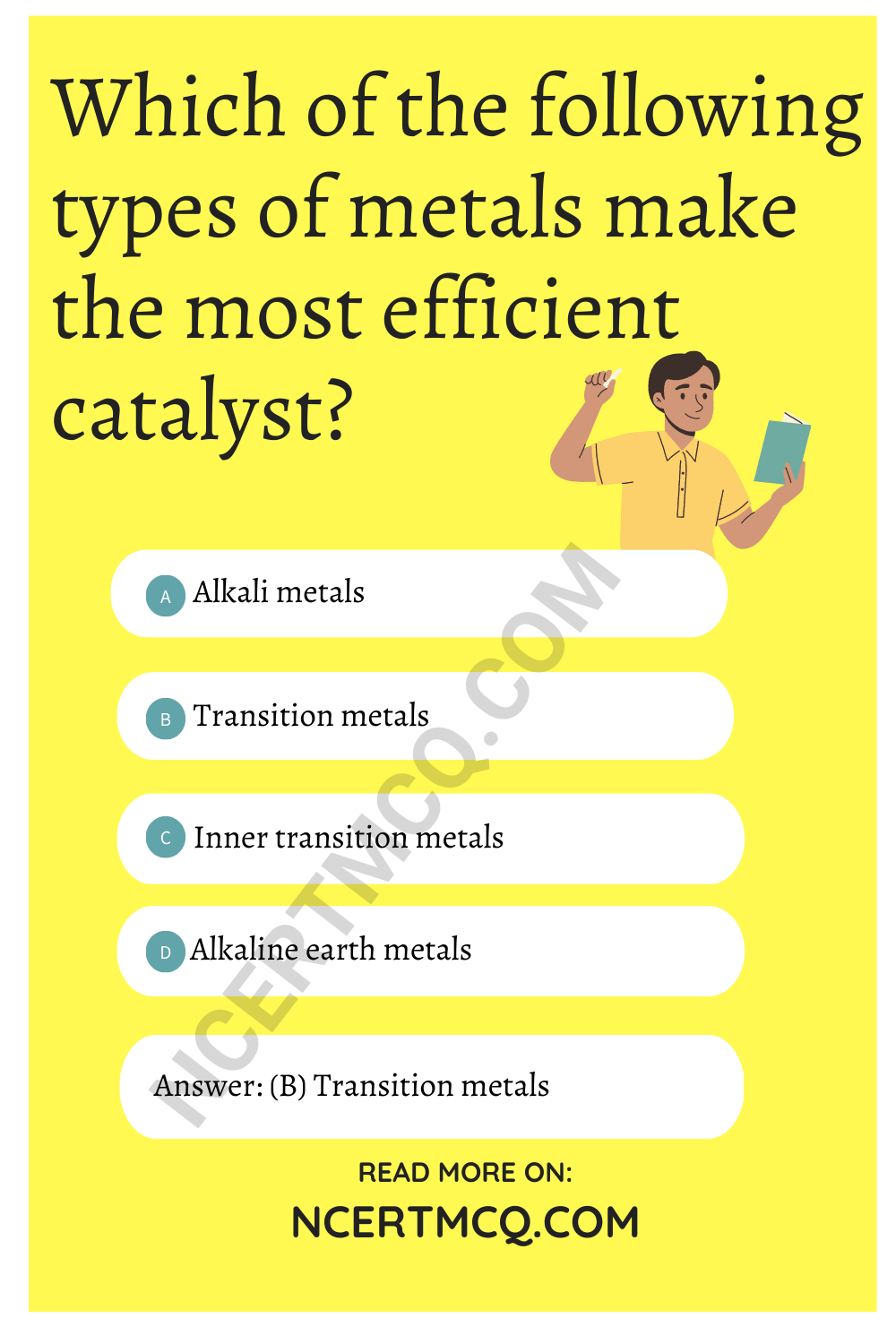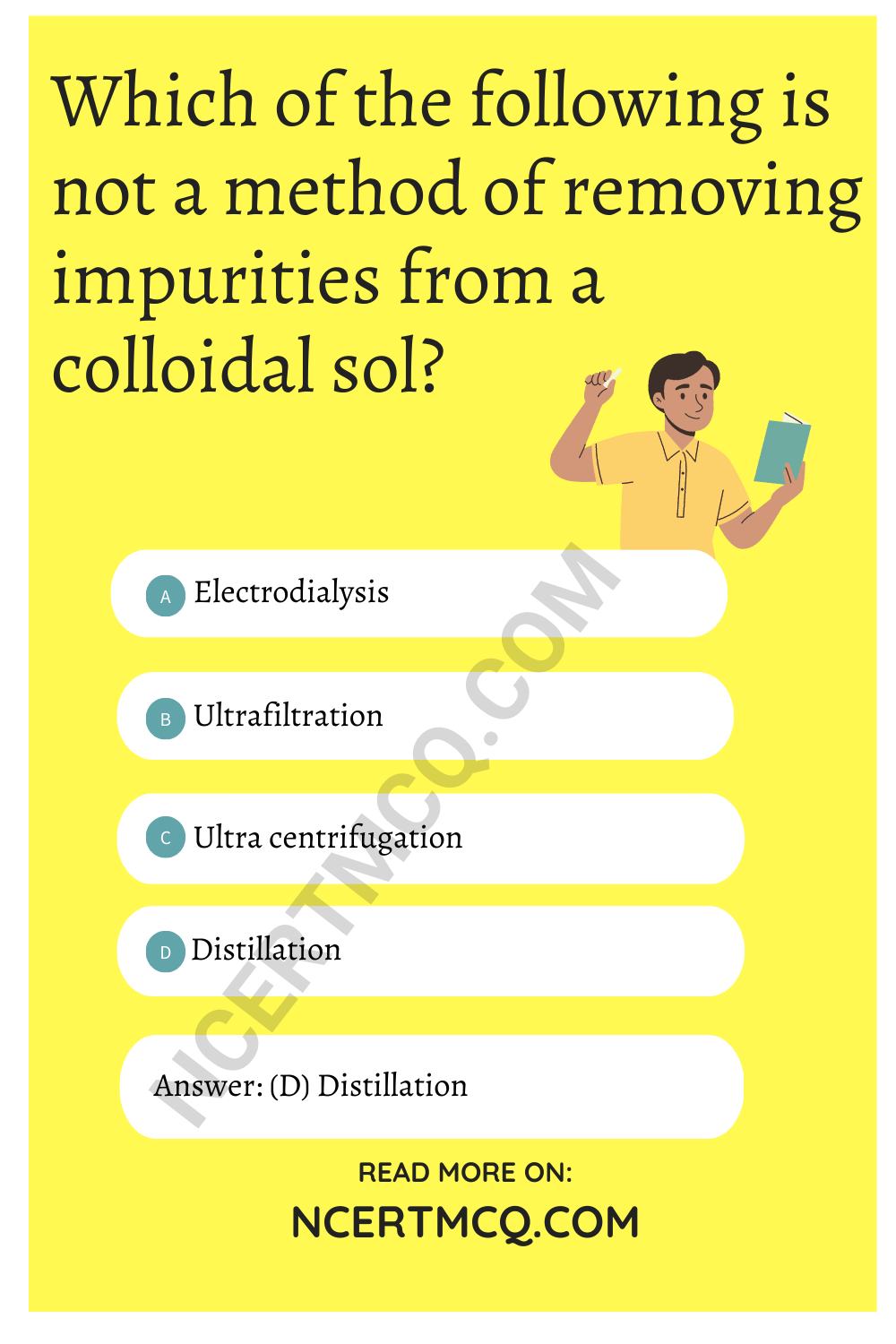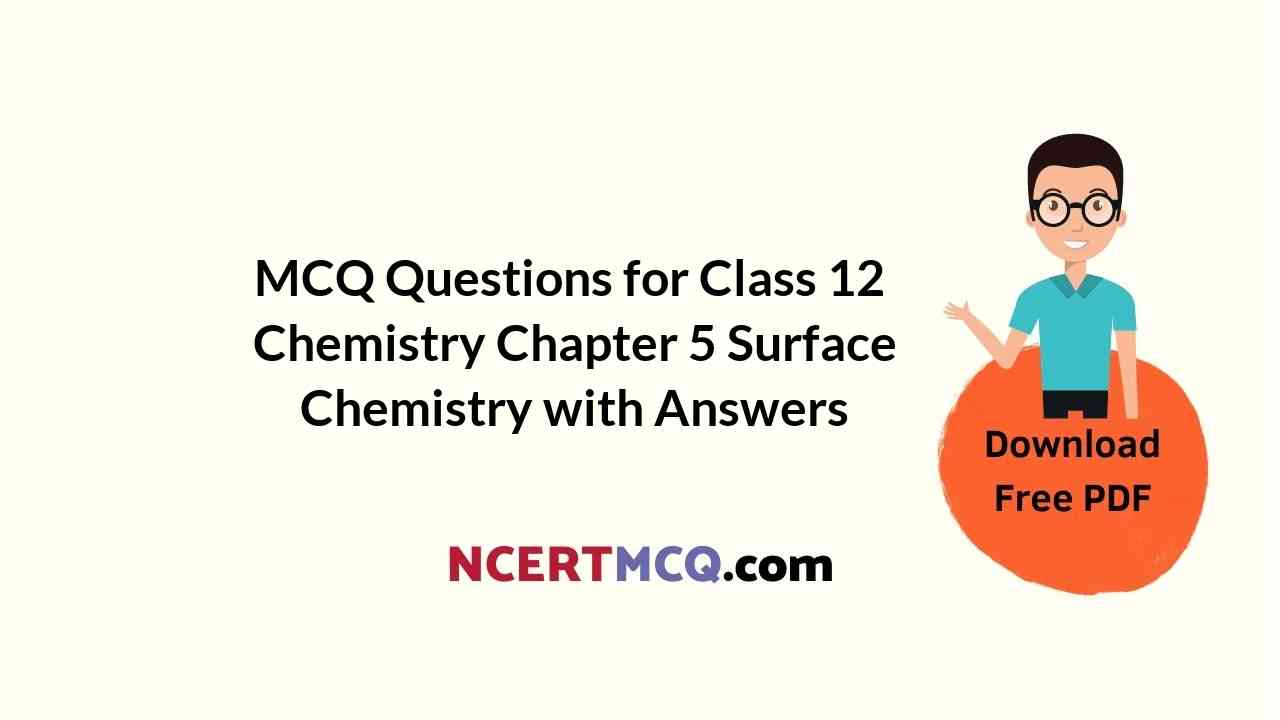Check the below NCERT MCQ Questions for Class 12 Chemistry Chapter 5 Surface Chemistry with Answers Pdf free download. MCQ Questions for Class 12 Chemistry with Answers were prepared based on the latest exam pattern. We have provided Surface Chemistry Class 12 Chemistry MCQs Questions with Answers to help students understand the concept very well.
Class 12 Chemistry Chapter 5 MCQ With Answers
Chemistry Class 12 Chapter 5 MCQs On Surface Chemistry
Surface Chemistry MCQ Question 1.
Volume of one mole of any gas at NTP is
(a) 11.2 litre
(b) 22.4 litre
(c) 10.2 litre
(d) 22.8 litre
Answer
Answer: (b) 22.4 litre
Surface Chemistry Class 12 MCQ Question 2.
Tyndall effect confirms the
(a) gravity effect on the sol. particles
(b) light scattering by the sol. particles
(c) heterogeneous nature of sols.
(d) Brownian motion of the sol. particles
Answer
Answer: (c) heterogeneous nature of sols.
MCQ On Surface Chemistry Question 3.
Which one of the following is alyophilic colloid?
(a) Milk
(b) Gum
(c) Fog
(d) Blood
Answer
Answer: (b) Gum
Class 12 Chemistry Chapter 5 MCQ Question 4.
Which of the following is not correct for enzyme catalysis?
(a) The enzyme activity is maximum at optimum pH which is between 5-7
(b) Each enzyme is specific for a given reaction
(c) The favourable temperature range of enzyme activity is between 25-37°C
(d) The enzymatic activity is increased in presence of certain substances.called co-enzymes
Answer
Answer: (c) The favourable temperature range of enzyme activity is between 25-37°C
MCQ On Surface Chemistry Class 12 Pdf Question 5.
Presence of traces of arsenious oxide (As2O3) in the reacting gases SO2 and O3 in presence of plantinised asbestos in contact process acts as
(a) catalytic promoter
(b) catalytic poison
(c) dehydrating agent
(d) drying agent
Answer
Answer: (b) catalytic poison
Ans. (b)
MCQ Of Surface Chemistry Class 12 Question 6.
Shape selective catalysis is a reaction catalysed by
(a) zeolite
(b) enzymes
(c) platinum
(d) Ziegler-Natta catalyst
Answer
Answer: (a) zeolite
Surface Chemistry MCQ Questions Question 7.
Which of the following types of metals make the most efficient catalyst?
(a) Alkali metals
(b) Transition metals
(c) Inner transition metals
(d) Alkaline earth metals
Answer
Answer: (b) Transition metals

Surface Chemistry MCQ With Answers Pdf Question 8.
The oxide of nitrogen which acts as a catalyst in lead chamber process is
(a) NO
(b) NO2
(c) N2O4
(d) H2O5
Answer
Answer: (a) NO
Surface Chemistry MCQ Pdf Download Question 9.
The activity of an enzyme becomes ineffective
(a) at low temperature
(b) at atmospheric pressure
(c) at high temperature
(d) in aqueous medium
Answer
Answer: (c) at high temperature
Surface Chemistry Class 12 Objective Questions Question 10.
Which of the following can adsorb larger volume of hydrogen gas?
(a) Finely divided platinum
(b) Colloidal solution of palladium
(c) Small pieces of palladium
(d) A single metal surface of platinum
Answer
Answer: (b) Colloidal solution of palladium
MCQ Questions On Surface Chemistry Question 11.
Which of the following gases present in a polluted area will be adsorbed most easily on the charcoal gas mask?
(a) H2
(b) O3
(c) N2
(d) SO2
Answer
Answer: (d) SO2
Chapter 5 Chemistry Class 12 MCQs Question 12.
Which kind of catalysis can be explained on the basis of adsorption theory ?
(a) Homogeneous catalysis
(b) Heterogeneous catalysis
(c) Negative catalysis
(d) Auto catalysis
Answer
Answer: (b) Heterogeneous catalysis
Surface Chemistry MCQ Class 12 Question 13.
A colloidal system is which liquid is dispersed phase and solid is dispersion medium is classified as
(a) gel
(b) sol
(c) emulsion
(d) aerosol
Answer
Answer: (a) gel
Class 12 Surface Chemistry MCQ Question 14.
Which of the following will not form a colloidal system?
(a) Solid-gas
(b) Liquid-gas
(c) Gas-gas
(d) Gas-liquid
Answer
Answer: (c) Gas-gas
Surface Chemistry Class 12 MCQ Questions Question 15.
Fog in an example of colloidal system of
(a) liquid in gas
(b) gas in liquid
(c) solid in gas
(d) gas in solid
Answer
Answer: (a) liquid in gas
Question 16.
Substances which behave as normal electrolytes solution at low concentration and exhibit colloids properties at higher concentration are called
(a) lyophilic colloids
(b) lyophobic colloids
(c) macromolecular colloids
(d) associated colloids
Answer
Answer: (d) associated colloids
Question 17.
Which of the following acts as the best coagulating agent for ferric hydroxide sol?
(a) Potassium ferrocyanide
(b) Potassium chloride
(c) Potassium oxalate
(d) Aluminium chloride
Answer
Answer: (a) Potassium ferrocyanide
Question 18.
The formation of micelles takes place only above
(a) critical temperature
(b) Kraft temperature
(c) inversion temperature
(d) absolute temperature
Answer
Answer: (b) Kraft temperature
Question 19.
The size of colloidal particles ranges between
(a) 10-7 – 10-8 cm
(b) 10-9 – 10-11 cm
(c) 10-4 – 10-7 cm
(d) 10-2 – 10-3 cm
Answer
Answer: (c) 10-4 – 10-7 cm
Question 20.
At CMC (critical micelle concentration) the surface molecules
(a) dissociate
(b) associate
(c) become bigger in size due to adsorption
(d) become smaller in size due to decomposition
Answer
Answer: (b) associate
Question 21.
Which of the following is not a method for coagulation of lyophobic sols?
(a) By electrophoresis
(b) By mixing oppositely charged sols
(c) By adding electrolyte
(d) By adding a protective colloid
Answer
Answer: (d) By adding a protective colloid
Question 22.
Why is alum added to water containing suspended impurities?
(a) To make acolloidal solution
(b) To coagulate the suspended impurities
(c) To remove impurities of calcium and magnesium
(d) To protect the colloidal solution from gening precipitated
Answer
Answer: (b) To coagulate the suspended impurities
Question 23.
Movement of dispersion medium under the influence of electric field is known as
(a) electrodialysis
(b) electrophoresis
(c) electroosmosis
(d) cataphoresis
Answer
Answer: (c) electroosmosis
Question 24.
Which of the following is not a method of removing impurities from a colloidal sol?
(a) Electrodialysis
(b) Ultrafiltration
(c) Ultra centrifugation
(d) Distillation
Answer
Answer: (d) Distillation

Question 25.
The substances which behave as colloidal solutions at higher concentration are called
(a) associated colloids
(b) multimolecular colloids
(c) macromolecular colloids
(d) protective colloids
Answer
Answer: (a) associated colloids
We hope the given NCERT MCQ Questions for Class 12 Chemistry Chapter 5 Surface Chemistry with Answers Pdf free download will help you. If you have any queries regarding Surface Chemistry CBSE Class 12 Chemistry MCQs Multiple Choice Questions with Answers, drop a comment below and we will get back to you soon.
Class 12 Chemistry MCQ:
- The Solid State Class 12 MCQ
- Solutions Class 12 MCQ
- Electrochemistry Class 12 MCQ
- Chemical Kinetics Class 12 MCQ
- Surface Chemistry Class 12 MCQ
- General Principles and Processes of Isolation of Elements Class 12 MCQ
- The p-Block Elements Class 12 MCQ
- The d-and f-Block Elements Class 12 MCQ
- Coordination Compounds Class 12 MCQ
- Haloalkanes and Haloarenes Class 12 MCQ
- Alcohols, Phenols and Ethers Class 12 MCQ
- Aldehydes, Ketones and Carboxylic Acids Class 12 MCQ
- Amines Class 12 MCQ
- Biomolecules Class 12 MCQ
- Polymers Class 12 MCQ
- Chemistry in Everyday Life Class 12 MCQ
